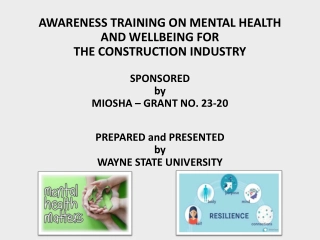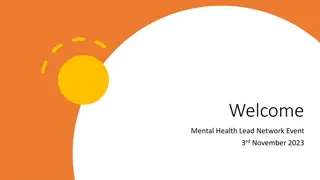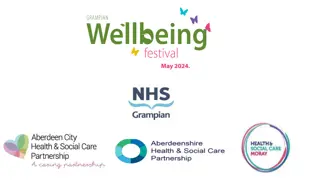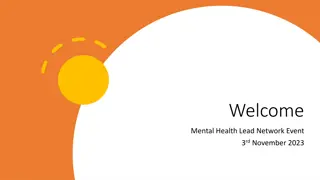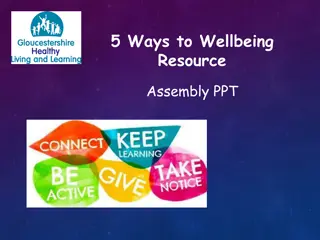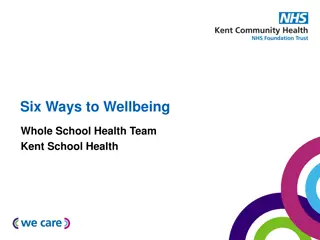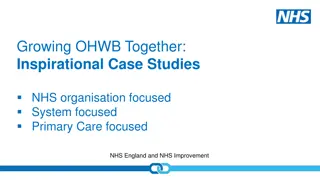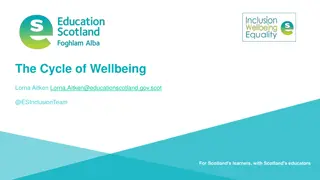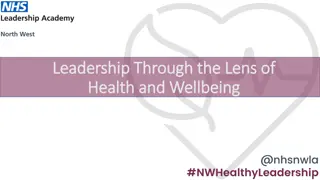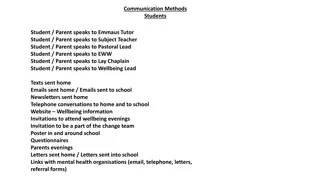July 2021 Student Mental Health & Wellbeing Survey Report
This July 2021 survey report commissioned by NUS, NUS Charity, and TOTUM focuses on understanding students' perceptions of the ongoing Coronavirus pandemic's impacts on mental health and wellbeing. The report delves into vaccination statuses, fear levels of contracting the virus, and students' agreement with statements related to Maslow's Hierarchy of Needs.
Download Presentation

Please find below an Image/Link to download the presentation.
The content on the website is provided AS IS for your information and personal use only. It may not be sold, licensed, or shared on other websites without obtaining consent from the author.If you encounter any issues during the download, it is possible that the publisher has removed the file from their server.
You are allowed to download the files provided on this website for personal or commercial use, subject to the condition that they are used lawfully. All files are the property of their respective owners.
The content on the website is provided AS IS for your information and personal use only. It may not be sold, licensed, or shared on other websites without obtaining consent from the author.
E N D
Presentation Transcript
July Coronavirus Student Survey phase 5 July and August 2021 Scotland Report; Mental health & wellbeing Commissioned by NUS, NUS Charity and TOTUM Delivered by NUS Insight
Project Overview Objectives Methodology This is the fifth survey in the series commissioned by NUS, NUS Charity and TOTUM to understand more about how students feel about the current Coronavirus (Covid-19) pandemic and the impacts they are experiencing. Previous surveys phases 1, 2 3 and 4 - took place in March, July and November 2020 and March 2021 respectively. The main focus of this report is to compare data with that a year ago in July 2020. A sample of 5173 was achieved across all nations. Respondents were given a chance to win 500 to encourage response. The survey was promoted via the NUS Student database, the TOTUM database, and through NUS channels. The survey took around 20minutesto complete and was in field from 20th July to 19th August 2021 For Scotland we achieved a sample of 354 students
88% of students have had their first, or both their first and second Covid vaccinations. And a further 5% say they plan to have their vaccinations as soon as they can. New for August 2021 Vaccination status I have had my first COVID vaccination 36% I have had both my first and second vaccination 52% I have not had any vaccinations yet but plan to have them as soon as I can / it is booked in 5% I have not had any vaccinations and do not plan to get them 5% Other 2% Prefer not to say 1% 0% 10% 20% 30% 40% 50% 60% Weighted Base: 354 respondents. Balance: no response B1. Which of the following applies to you?
Fear amongst students of contracting Coronavirus has continued to drop over the past year. Similar to previous waves, the largest proportion (around one in three) feel somewhat scared about contracting Coronavirus and a quarter feel not very scared . Tracked from July Feelings towards contracting the Coronavirus (Covid-19) 2020 10% I have tested positive for Coronavirus (Covid- 19) (whether presently or previously) 15% I am not at all scared that I will contract Coronavirus (Covid-19) 7% 26% I am not very scared that I will contract Coronavirus (Covid-19) Aug-21 32% Jul-20 36% I am somewhat scared that I will contract Coronavirus (Covid-19) 42% 11% I am very scared that I will contract Coronavirus (Covid-19) 18% 2% Don t know 1% 0% 10% 20% 30% 40% 50% Weighted Base: 355 respondents. Balance: no response B2. Which, if any, of the following statements best describes your feelings towards contracting the Coronavirus (Covid- 19)?
Students agreement with statements linked to Maslows Hierarchy of Needs have remained fairly constant over the past year; largely agreeing that their basic & safety needs are being met. Again with the exception of sleep - only 47% agree to some extent that they are sleeping well. Feelings of love and belonging continue to be high (sufficient contact with others) and financial stability has improved (56% agreeing in July 2020 up to 66% Aug 2021). Feelings of esteem and self actualisation continue to be much lower. Agreement with statements Tracked from July 2020 I feel safe in my current accommodation/living circumstances 49% 37% 5% 2% 1% I am eating sufficiently (getting enough, good quality food) 30% 46% 11% 11% 2% 0% I am able to exercise 24% 44% 12% 13% 5% 1% Strongly agree I have enough money/financial support to afford the basics I need right now Agree 25% 41% 14% 11% 9% Neither agree nor disagree Disagree I have sufficient contact, whether in person with people I live with or virtually with others outside 27% 38% 13% 14% 7% I am able to study sufficiently in my current accomodation Strongly disagree 21% 42% 14% 14% 5% I am sleeping well 12% 35% 18% 23% 11% 1% I am achieving what I want to in life 14% 32% 2 17% 8% I am feeling good about myself 12% 30% 25% 11% 0% 22% 0% 20% 40% 60% 80% 100% Average weighted Base: 351 Balance: No response B3. Please tell us how far you agree, if at all, with the statements below within the context of the current Coronavirus (Covid-19) pandemic?
Continuing the pattern of previous phases, students are more likely to be concerned about the wellbeing of their family followed by the wellbeing of friends. Concern for themselves comes third. However compared to July 2020 concern as to whether they have to the tools and skills to manage their own wellbeing has increased up from 35%. Tracked from July Agreement with statements 2020 Strongly agree Agree Neither agree nor disagree Disagree Strongly disagree Don t know/Not applicable I am concerned about the wellbeing of some/all of my family 33% 42% 12% 9% 3% I am concerned about the wellbeing of some/all of my friends 19% 45% 18% 14% I am concerned about my own wellbeing 17% 39% 1 19% 8% I am concerned as to whether I have the tools and skills to manage my own wellbeing 11% 32% 24% 11% 21% 0% 20% 40% 60% 80% 100% Weighted average base: 351 Balance: No response B4.How far do you agree or disagree with the following statements as a result of Coronavirus (Covid-19)?
Encouragingly, the proportion of students indicating that their mental health has worsened since before the coronavirus pandemic, has decreased since March 2021 (55%) and November 2020 (55%). And the proportion saying it is better had risen from 7% in November 2020 to 13%. August 2021 Mental Health It is better 13% It is the same 36% It is worse 49% Prefer not to say 2% 0% 20% 40% 60% Weighted Base: 356 . Balance: No response B5. How would you describe your mental health and wellbeing currently compared to life before the Coronavirus pandemic
Students who have felt the impacts of Covid on their mental health have had a multitude of negative experiences. Isolation, loneliness and health concerns are leading to increased levels of anxiety, stress, worry, depression, sleep issues. August 2021 Negative impact on mental health Key themes: Depression Anxiety / panic Isolated / no interactions Financial concerns Sleep problems B6. Please tell us how you feel your mental health has been negatively affected by the pandemic
Although it appears that there has been an increase in the number of students seeking mental health support over the past two waves with around one in three now saying they have sought support up from 23% Nov 2020 and 24% March 2021, this is likely to be reflective of the drop in those choosing the prefer not to say option down from 12%. August 2021 Seeking mental health support Yes 35% No 62% Aug-21 Prefer not to say 2% 0% 20% 40% 60% 80% Weighted Base: 356. Balance: No response B7. Have you sought any mental health support throughout the Coronavirus pandemic?
Of those who have sought support, over two in five have been satisfied with what they have received. August 2021 Satisfaction with support Very satisfied 13% Somewhat satisfied 32% Neither dissatisfied nor satisfied 13% Aug-21 Somewhat dissatisfied 15% Very dissatisfied 15% I didn t receive any support 12% 0% 20% 40% Weighted Base: 126. Balance: Those not seeking support B8. How satisfied are you with the mental health support you have received?
Family continues to play a big role during the pandemic, with familial interactions increasing for around a third of students since the pandemic began. Interactions with fellow students, course mates and friends are down for the majority. Interactions August 2021 I am interacting with my family -30% -35% 36% I am interacting with my friends -61% -23% 16% The same I am interacting with my coursemates -61% -31% 8% Less I am interacting with other students in my institution -66% -28% 6% More I am interacting with clubs and societies -72% -24% 5% -100% -50% 0% 50% 100% Average weighted average base: 351 Balance: No response B9. Thinking about your interactions with people since the coronavirus pandemic began, please indicate how much you are interacting with the following now compared with before the pandemic
Half of students report being dissatisfied with the opportunities they have had to interact socially over the previous academic year. Satisfaction with social opportunities August 2021 Very dissatisfied 23% Somewhat dissatisfied 30% Neither dissatisfied nor satisfied 25% Somewhat satisfied 12% Very satisfied 4% NA 6% 0% 20% 40% Weighted Base: 351 respondents. Balance: no response B10. Thinking back to the previous academic year (2020-21), how satisfied are you with the opportunities you had to interact socially whether in person or remotely. For example, sharing time with others, meeting new people or having access to socialising facilities and activities
Students appear to be taking greater care of themselves compared to March 2021, with exercise, a daily routine and eating healthily moving to the top of the list. In tandem with social distancing rules relaxing and hospitality opening up, connecting with family and friends online has dropped from the top spot to 8th and partying/going out has shot up. Reading books and caring duties remain high however. Activities August 2021 Exercise -2% -22% 76% Maintain some sort of daily routine -4% -29% 67% Eating healthy food -5% -30% 65% Read books -6% -37% 57% Support and care for others -5% -46% 48% The same Going out to bars and pubs -24% -28% 47% Volunteering / giving something back to the community -6% -49% 45% Connect with friends/family remotely e.g. online -18% -38% 44% Less Be creative / do crafts -12% -45% 43% Partying in my student accommodation / a friends -29% -30% 41% Try to find work in a supermarket/pharmacy/other key -20% -40% 40% Look for self-help wellbeing guidance/apps -10% -51% 39% More Watch films -22% -52% 26% Gaming -27% -49% 23% Drinking -29% -49% 22% Gambling -33% -56% 11% -100%-80% -60% -40% -20% 0% 20% 40% 60% 80% 100% Weighted average base: x. Balance: No response B11. Thinking about the current pandemic, please tell us if you do more / less / the same of the following as you did pre-Covid.
Coronavirus Student Survey phase 5 July and August 2021 Scotland Report July and August 2021


